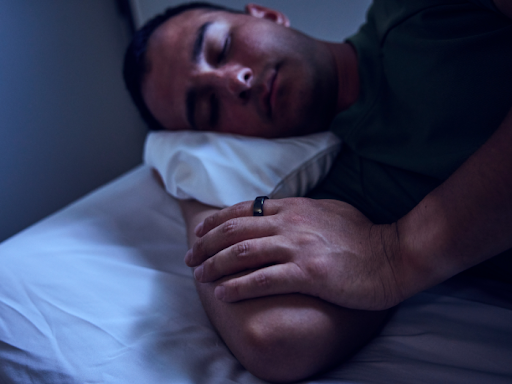- Some research suggests that cannabis can help you fall asleep faster and potentially treat certain sleep disorders and chronic conditions.
- However, studies and experts warn that it can lead to dependency and reduce the overall quality of your sleep. Oura advisor and sleep scientist Matthew Walker, PhD, notes that cannabis can lead to greater sleeping issues in the long run.
- Oura members can use custom tags and trends to track the effects of cannabis and other supplements on their sleep and health.
Curious to know how cannabis impacts sleep? You’re not alone.
As many as 70% of young adults reported using cannabis to help them sleep. And, according to anonymous data, “weed” is the second most popular custom tag used by Oura members. The plant and leaf emojis (🌱and 🍃) were also spotted among Oura members’ custom tags, which we can imagine might be a symbol for cannabis use.
It must be noted that in many states, territories, and countries, cannabis is an illegal substance. However, 38 states in the U.S. plus the District of Columbia (D.C.) now allow medical use of cannabis, while 24 states and D.C. have enacted measures to regulate cannabis for recreational use. And over 40 countries around the world have legalized the use of cannabis for some recreational or medicinal-only use.
If you’re among the cannabis-curious, here’s what you need to know about the effects of cannabis on sleep.
| Member Tip: In the Oura App, you can use Custom Tags and the Trends view to track how any habit, such as using cannabis, impacts your sleep quality over time. |
The Science of Cannabis and Sleep
Cannabis is a plant containing more than 100 compounds called cannabinoids. Cannabinoids are natural chemical components that have potential therapeutic effects. Among the most recognized cannabinoids for sleep are THC (tetrahydrocannabinol) and CBD (cannabidiol).
To grasp how they influence sleep, it’s essential to delve into the workings of the endocannabinoid system (ECS) in the brain and understand their interaction with it.
How the Endocannabinoid System Works
The endocannabinoid system (ECS) is a biological system in the brain and body made up of neurotransmitters (chemical messengers) and receptors.
Its primary role is to maintain homeostasis by regulating various physiological processes, including mood, memory, and sleep.
Think of the ECS as akin to a lock-and-key mechanism. Your body naturally produces endocannabinoids, acting as keys to ensure smooth functioning. Cannabinoids are similar keys that bind to endocannabinoid receptors to trigger specific actions.
These receptors come in two types:
- CB1 receptors, predominantly found in the central nervous system
- CB2 receptors, primarily found in the immune system
Because of its location in brain regions associated with the sleep-wake cycle, the CB1 receptor is considered the most important for regulating sleep. Research indicates that compounds activating CB1 receptors, such as those found in cannabis, can enhance sleep.
The Role of Cannabinoids in Sleep
Cannabinoids in cannabis closely resemble those naturally produced by your body, allowing them to fit into the same receptors (or “locks”). THC, in particular, binds to the CB1 receptor, making it a popular choice as a sleep aid.
Upon binding to the CB1 receptor, THC influences neurotransmitters like GABA and adenosine. GABA exerts a calming effect on the nervous system, while adenosine contributes to sleep pressure. Together, they induce feelings of calmness and drowsiness.
However, exactly how cannabis affects your sleep largely depends on the specific cannabinoid (e.g., THC, CBD, CBN), the dosage, consumption method (e.g., edibles vs. smoking), strain type (e.g., sativa, indica), age, and personal genetic and lifestyle factors.
For example, one study found that smoking marijuana disrupts sleep more than consuming an edible, while another study found that indica may offer more sleep benefits than sativa due to the higher CBD content. We’ll delve into this more below.
THC, CBD, & Sleep: What’s the Difference?
THC (tetrahydrocannabinol) is a psychoactive compound found in cannabis, associated with the “high” or drowsy feeling that many people report after using cannabis.
CBD (cannabidiol) is a non-psychoactive compound found in cannabis that won’t make you feel “high,” but may still offer therapeutic effects.
THC and CBD affect sleep differently based on the receptors they bind with in the endocannabinoid system. THC primarily interacts with CB1 receptors, promoting drowsiness and hastening sleep onset. CBD, on the other hand, interacts with various receptors, including CB1, CB2, and serotonin receptors, fostering relaxation and indirectly contributing to improved sleep quality.
READ MORE: 9 Science-Backed Herbs and Supplements for Better Sleep
How Cannabis Affects Sleep Quality
 Research indicates both benefits and drawbacks to using cannabis as a sleep aid. THC, for instance, may facilitate quicker sleep onset, yet not without potential consequences. Conversely, CBD may offer fewer adverse effects but could be less potent in inducing sleep.
Research indicates both benefits and drawbacks to using cannabis as a sleep aid. THC, for instance, may facilitate quicker sleep onset, yet not without potential consequences. Conversely, CBD may offer fewer adverse effects but could be less potent in inducing sleep.
Cannabis and Deep Sleep
Although some people report enjoying deep sleep after smoking weed, it’s not the full picture. A 2008 review found that THC increases deep sleep, but it reduces REM sleep, altering the delicate balance of sleep architecture. This disruption may lead to waking up feeling groggy despite experiencing more deep sleep.
Does Cannabis Impact REM Sleep?
Research suggests that cannabis can suppress REM sleep, leading to a rebound effect where the brain attempts to recover lost REM sleep during later stages of sleep.
Oura advisor and sleep scientist, Matthew Walker, PhD, author of Why We Sleep, states that cannabis has been demonstrated to impair REM sleep night after night. “In the early hours of the morning, your brain will try to regain the REM sleep it has lost. However, the recovery is often incomplete, which leads to a chronically building REM sleep debt.”
Influence of Cannabis on Sleep Consistency
Long-term cannabis use can disrupt sleep regulation, leading to variations in sleep duration. Studies indicate a dose-dependent relationship, with heavier cannabis use correlating with more extreme alterations in sleep duration.
READ MORE: How Dreams Help Regulate Your Emotions and Reduce Stress
The Potential Benefits of Cannabis for Sleep Disorders
Cannabis shows some promise in managing various sleep disorders, as supported by a growing body of research.
Cannabis for Insomnia
Insomnia sufferers may find relief in cannabis, which people may perceive to be a more “natural” alternative to medication. In a 2022 study, research showed improvement in self-reported sleep outcomes among users of medical cannabis.
Notably, a significant percentage of participants reported reduced reliance on prescription sleep medications, underscoring cannabis’ potential in addressing insomnia.
Cannabis as a Treatment for Chronic Conditions
Beyond insomnia, cannabis may alleviate sleep disturbances associated with chronic conditions.
For instance, a 2023 study found that cannabis reduced pain intensity and improved sleep quality in a group of cancer patients, while a 2022 study found that it led to “significant improvements in symptom severity” in people experiencing insomnia due to anxiety and depression.
Could Cannabis Help with Nightmares and Other Sleep Disturbances?
Cannabis before bed may help ease a variety of common sleep disturbances, like nightmares. A 2021 study found that 72% of people with post-traumatic stress disorder (PTSD) experienced total cessation or a reduction in nightmares after the use of nabilone, a synthetic form of THC.
Cannabis Can Help You Fall Asleep Faster — But Be Wary
A 2021 study found that with short-term use, cannabis reduces sleep latency and reduces awake time during the night. “The best way to describe it is that cannabis speeds the onset of non-consciousness — meaning it may not product naturalistic sleep,” Dr. Walker notes. “While the idea of falling asleep faster may sound helpful, there are issues with that.”
A 2017 study noted that the decrease in sleep latency is commonly felt only in the short term due to increasing tolerance; over time, it can actually impair your overall sleep quality.
| Member Tip: Sleep latency is one of Oura’s Sleep Score contributors. Generally, aim for a latency between between 5 and 20 minutes. |
Risks & Drawbacks of Using Cannabis for Sleep
 Short-Term Side Effects and Impact on Sleep
Short-Term Side Effects and Impact on Sleep
Studies have indicated possible side effects of using cannabis, including increased anxiety and unease, which may negatively impact your sleep. Plus, everyone reacts differently to cannabis, so the effects are not guaranteed.
And there’s a risk of dependency, even in the short term: “When you start using cannabis for sleep, there can be a dependency or tolerance, which means you may need to start more to get the same benefit,” Dr. Walker says.
Long-Term Impact of Cannabis Use on Sleep
Long-term cannabis use may have complex effects on sleep. While short-term use may help with sleep initiation, chronic use could lead to tolerance, dependence, and disruptions in sleep architecture.
Research suggests that frequent or heavy cannabis use may contribute to difficulties with sleep onset, maintenance, and overall sleep quality over time.
Plus, if you relinquish your cannabis-before-bed habit, your sleep quality may worsen before it gets better. A 2008 study found that when heavy marijuana users tried to quit, they experienced more significant sleep disturbances, including a rebound of REM sleep, more nightmares, and a risk of insomnia.
Cannabis Strains and Sleep
Indica, Sativa, & Hybrid Strains: What’s the Difference?
Indica, sativa, and hybrid are three distinct types of cannabis plants, each with unique characteristics.
- Indica: Typically associated with sedative effects, Indica strains are known for producing a more relaxed high.
- Sativa: Sativa strains are known for their energizing and uplifting effects, producing a more cerebral high.
- Hybrid: Hybrid strains are a crossbreed of Indica and Sativa plants, combining the effects of both types.
Popular Cannabis Strains for Sleep
When it comes to the most popular cannabis strain for sleep, it’s between indica and CBD.
Due to its relaxing and sedating effects, indica is often the choice for people looking to improve their sleep. A 2010 study considered the best cannabis strain for sleep, concluding that indica reduced insomnia symptoms more than sativa, hybrid, and CBD.
Less research has been done to examine the effects of CBD on sleep. However, according to Dr. Walker, preliminary studies have suggested that CBD does not seem to be as detrimental to your sleep as THC.
A 2017 review found that, in the short term, CBD “holds promise” for REM sleep behavior disorder and excessive daytime sleepiness. A randomized controlled trial published this year found that 15 mg of CBD led to significant improvements in sleep disturbance. However, the researchers note that CBD did not have any clinical benefit over 5mg of melatonin.
While CBD shows promise, more research is needed to determine its efficacy and optimal dosage for sleep regulation.
Recommendations for Using Cannabis for Sleep
Caution and moderation are advised when using cannabis for sleep, considering the potential risks associated with dependency and tolerance. Consulting with healthcare professionals and adhering to safe usage practices is essential for maximizing benefits while minimizing adverse effects.
Legal Considerations for Using Cannabis for Sleep
Adherence to local laws and regulations governing cannabis use is imperative to ensure legality and safety. Consultation with medical professionals is encouraged to navigate potential legal and health implications.
RELATED: The Physiological Sigh: A 30-Second Breathing Exercise to Lower Stress
About the Oura Expert
Matthew Walker, PhD, is a renowned sleep scientist and professor of Neuroscience and Psychology at the University of California, Berkeley and a member of Oura’s Medical Advisory Board. He is also the founder and director of the Center for Human Sleep Science at UC Berkeley, where he conducts research on the effects of sleep on human health, well-being, and performance. Dr. Walker has authored numerous scientific articles and book chapters on sleep, and is the author of the bestselling book “Why We Sleep: Unlocking the Power of Sleep and Dreams.” He is a frequent speaker at scientific conferences, TED Talks, and media outlets, and is widely recognized as a leading authority in the field of sleep science.




